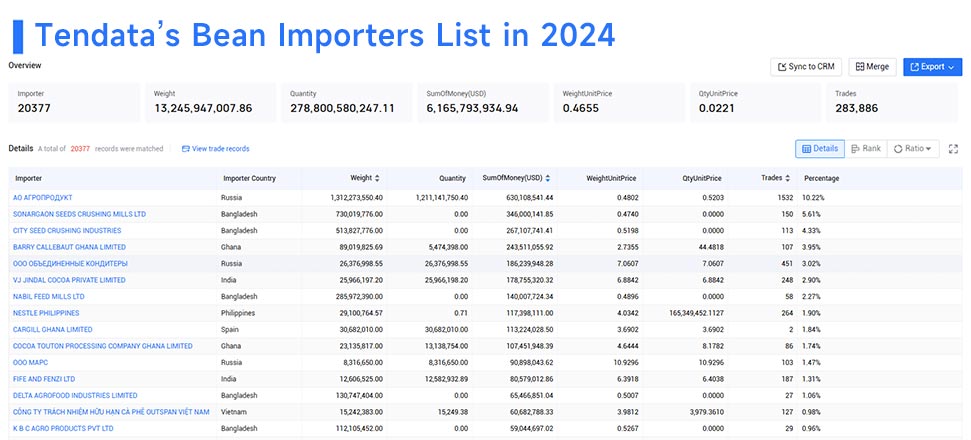 Import News
Import News
 2025-08-27
2025-08-27
Located in Southeast Asia, Malaysia serves as a key gateway between the Pacific Ocean and the Indian Ocean. With its diverse economy, Malaysia is well-placed to capitalize on trade with major partners such as China, the U.S., and ASEAN nations. Its natural resources, advanced infrastructure, and growing technology sector further bolster its trade potential.

Malaysia, an upper middle-income economy, ranks as the 35th largest globally by nominal GDP. According to the latest data released by the Malaysia External Trade Development Authority, in 2024, Malaysia's trade volume reached 2.879 trillion ringgit, increasing by 9.2% year-on-year and setting a new historical record. It has exceeded the 2 trillion ringgit mark for four consecutive years. Among them, imports of Malaysia rose significantly, growing by 13.2% to 1.371 trillion ringgit, reflecting the country's rising demand for energy, machinery, and high-tech products.
Top 10 Main Imports of Malaysia
1. Electrical Machinery (HS Code: 8542)
Malaysia's electronics industry is highly developed, with electrical machinery and semiconductor devices accounting for the largest proportion of imports. They are widely used in the fields of smart phones, computers and automotive electronics, and are also key raw materials for Malaysia's export assembly products.
2. Petroleum Oils (HS Code: 2710)
Although Malaysia is an oil-producing country, due to the disparity between its refining capacity and consumer demand, it still needs to import a large amount of petroleum products. Imported oil mainly meets the demands of transportation, power generation and petrochemical industries.
3. Machinery and Mechanical Appliances (HS Code: 8471)
These mechanical equipment, including computers, automated devices and industrial production machinery, support the development of Malaysia's manufacturing industry and export processing zones. Especially in the assembly of electronic products and high-tech manufacturing, there is an extremely high reliance on precision machinery.
4. Plastics (HS Code: 3901)
Plastic, as an important raw material, is widely used in packaging, automotive parts, consumer electronics and home furnishing industries. Malaysia has a huge export volume of plastic products, so it is particularly important to import upstream plastic raw materials.
5. Iron and Steel (HS Code: 7208)
With the expansion of infrastructure construction and manufacturing in Malaysia, the demand for steel has continued to grow. Imported steel is mainly used in construction, shipbuilding, mechanical manufacturing and the automotive industry.
6. Chemicals (HS Code: 2902)
Organic chemicals are a key input in Malaysia's chemical, pharmaceutical, rubber and plastic industries. Especially in the rubber products and glove industries, imported chemicals play a role in plasticizing, stabilizing and functional modification.
7. Vehicles (HS Code: 8703)
Automobiles are a key area of consumer spending in Malaysia, with a strong demand for imported vehicles, especially those from Japan, South Korea and Europe. In addition to personal passenger vehicles, imported commercial vehicles also meet the development needs of the logistics and transportation industries.
8. Medical Instruments (HS Code: 9018)
The import of medical devices in the Malaysian market has been increasing year by year, especially surgical instruments, imaging diagnostic equipment and monitoring devices. With the modernization of the medical system and the trend of population aging, the related demands have become more stable.
9. Pharmaceuticals (HS Code: 3004)
Pharmaceutical products are an important link in safeguarding the medical system. Malaysia relies on imported drugs to meet the demands for chronic diseases and specific medications. Multinational pharmaceutical companies dominate the Malaysian market.
10. Optical Instruments (HS Code: 9001)
Optical instruments are widely used in communication, medical care, scientific research and the electronics manufacturing industry. Malaysia imports such products not only for industrial upgrading but also to support scientific research and the development of high-tech.
Malaysia's top ten imported products cover energy, manufacturing, healthcare, automobiles and high-tech industries, demonstrating the diversified demands of its economy. Imports not only support domestic consumption but also feed back to the development of export-oriented manufacturing.
>>Get a Free Demo from Tendata<<
Tendata, as a professional provider of import data services, has a massive global trade database covering multiple countries and regions such as main imports of Malaysia’s markets. For example, by searching Bean(HS code: 72044900), importers of Malaysia can instantly access a list of active buyers with purchase records from the past year, including company names, purchase amounts, frequencies, and recent transactions.

Category
Leave Message for Demo Request or Questions


 T-info
T-info T-discovery
T-discovery

 My
Tendata
My
Tendata Market Analysis
Market Analysis Customer
Development
Customer
Development Competitor
Monitoring
Competitor
Monitoring Customer Relationship
Customer Relationship





































































































































